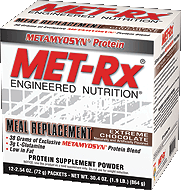
August 25, 2009
Can Meal Replacements Build Muscle?
Just got back from lecturing at CanFitPro (Toronto is a really great city, BTW!), and as always, I got a chance to walk around the trade show and see what was new in fitness retail. One thing stood out to me: in one of the booths, a supplement manufacturer representative was hawking his brand of meal replacement shake as a supreme muscle builder. His pitch: use meal replacements to build better muscles.

Now I’m a big believer in the benefits of meal replacements, specifically for those who have trouble getting adequate nutrition. Essentially, meal replacements are a high protein, low fat, moderate carbohydrate food source that is rich in vitamins and minerals. They are designed to provide a maximal amount of nutrients (nutrient density is perhaps the most important aspect of a healthy diet) in a format that is not inclined to promote significant body fat storage. And best of all, they’re very convenient. Good stuff.
But let’s be clear here, meal replacements will not directly build your muscles or make you stronger. The contention that they have powerful “steroid-like effects” that will somehow miraculously transform your body from fat to fit is nonsense. Not going to happen. Although dietary protein is essential in the muscle building process, simply adding meal replacements to your diet will have no effect on building better muscles. And provided you get adequate protein from your diet, consuming extra protein is superfluous: any excess beyond what your body can use is simply excreted (or in the case where there is a caloric excess, stored as fat).
As a general rule, meal replacements are best utilized as an adjunct to a well-balanced nutritional regimen—not as a substitute for natural foods. They fill a specific dietary niche, but by no means are a complete source of nutrition. If you find it difficult to prepare meals and/or get adequate protein in your diet, combining meal replacements with natural foods is the best way to satisfy all of your nutritional requirements, ensuring an optimal intake of nutrients.
If you choose to use meal replacements, it is best to eat a hearty breakfast, lunch and dinner, using shakes as “interim” meals. On occasion, you can swap a meal replacement for whole foods if you simply don’t have time to prepare a meal. It is widely recognized that a diet consisting of small, frequent meals (five a day) spaced out every three hours or so provides optimal nutritional utility. Eating in this fashion helps to optimally regulate blood sugar levels and stabilize various hormonal processes, allowing your body to operate at peak efficiency. Furthermore, it helps to suppress hunger and thus prevent the temptation to snack on “empty calorie” foods that are high in saturated fat and sugars. Since meal replacements are convenient and easy to prepare, they facilitate your ability to consume quality nutrients at regular intervals without expending a great deal of effort. Just don’t expect to get buff from a shake!
Stay Fit!
Brad
No Comments
No comments yet.
RSS feed for comments on this post.
Sorry, the comment form is closed at this time.





 Entries (RSS)
Entries (RSS)



